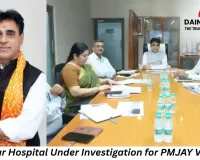Supreme Court Seeks Rajasthan’s Response on New Anti-Conversion Law After Constitutional Challenge
Digital Desk

The Supreme Court on Monday issued a notice to the Rajasthan government on a petition challenging the state’s newly implemented anti-conversion law. A bench of Justices Vikram Nath and Sandeep Mehta asked the state to file its response within four weeks after hearing a plea by the Jaipur Catholic Welfare Society, which argued that the legislation exceeds constitutional limits and contradicts earlier Supreme Court rulings.
The Rajasthan Prohibition of Unlawful Religious Conversion Act, 2025, came into force on 29 October after receiving the Governor’s approval. The Assembly had passed the bill on 9 September, introducing some of the strictest provisions in the country against what it defines as coercive or fraudulent religious conversions.
The petition contends that the law encroaches upon personal freedoms and grants the state excessive authority, particularly through clauses that allow demolition of properties allegedly linked to mass conversions. Under the Act, local authorities may seal or raze buildings if investigations find they were used for illegal conversions or constructed on encroached land. The administration is empowered to seize properties where mass conversions are found to have occurred.
Another controversial provision includes punishment of up to 20 years’ imprisonment in cases involving so-called “Love Jihad.” Marriages conducted solely for the purpose of conversion can be annulled under the Act.
The law also mandates a lengthy approval process for voluntary conversions. Individuals must inform the Collector or ADM at least 90 days in advance and submit a declaration affirming their decision. Religious leaders performing the conversion must notify the Magistrate two months beforehand, after which authorities will publicly display the details and invite objections.
With the Supreme Court’s notice, the law now faces its first major legal test. The outcome is expected to influence the broader national debate over anti-conversion legislation and the balance between religious freedom and state oversight.










4.jpg)
